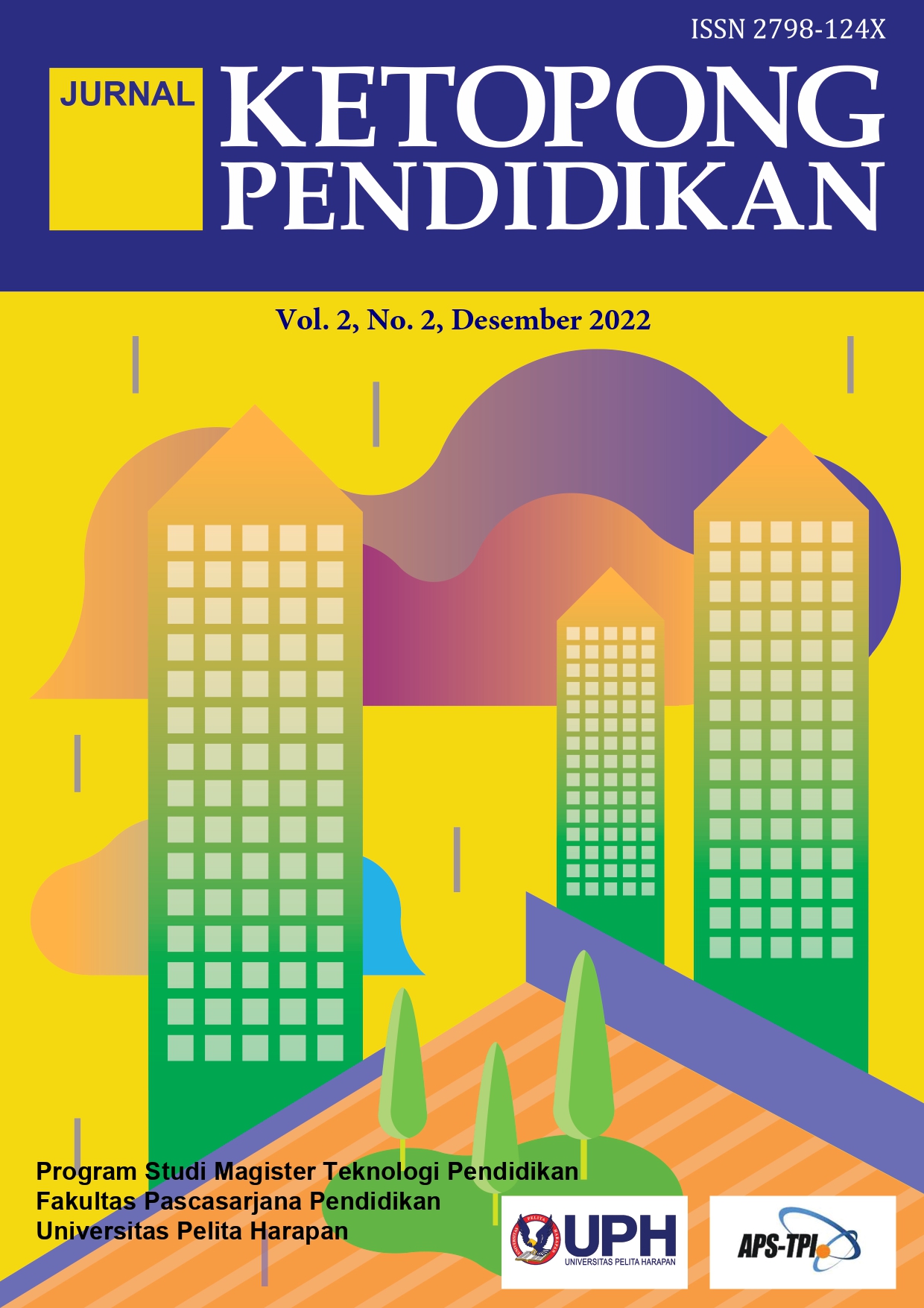Pengaruh Perilaku Inovatif, Iklim Organisasi Sekolah Serta Teacher Engagement Terhadap Task Performanced di Sekolah XYZ Jakarta
DOI:
https://doi.org/10.19166/jkp.v2i2.10299Kata Kunci:
Organizational Behavior, Teacher Engagement, School Organizational Climate, Task PerformanceAbstrak
The success of a school is highly influenced by the task performance of its teachers. Teachers' task performance is associated with various factors, including teachers’ innovative behavior, the organizational climate of the school, and teacher engagement. This study aims to examine the influence of teachers' innovative behavior, school organizational climate, and teacher engagement on teachers' task performance. The research subjects consist of one hundred and fifteen teachers teaching from early childhood education to senior high school levels at an XYZ Cooperation Education Unit (SPK) school in Jakarta. The research design used is path analysis with a quantitative approach. The findings indicate that innovative behavior has a positive influence on teachers' task performance, organizational climate has a positive influence on teachers' task performance, and teacher engagement also has a positive influence on teachers' task performance. These results emphasize that schools need to create a supportive organizational climate, encourage teachers to be innovative in their teaching practices, and strengthen teacher engagement in order to maximize overall performance. In addition, the study highlights the interconnected role of innovation, climate, and engagement as key determinants of effective task performance. Strengthening these factors will ultimately contribute to improving the quality of education and the overall success of schools.
Referensi
Ahn, J., Lee, S., & Yun, S. (2018). Leaders’ core self-evaluation, ethical leadership, and employees’ job performance: The moderating role of employees’ exchange ideology. Journal of Business Ethics, 148(2), 457−470. http://dx.doi.org/10.1007/s10551-016-3030-0 Retrieved from https://search.proquest.com/docview/2015575984?accountid=25704
Alfes, K., Shantz, A., & Alahakone, R. (2016). Testing additive versus interactive effects of person-organization fit and organizational trust on engagement and performance. Personnel Review, 45(6), 1323−1339. https://doi.org/10.1108/PR-02-2015-0029
Aryee, S., Walumbwa, F.O., Zhou, Q., & Hartnell, C.A. (2012). Transformational leadership, innovative beahior, and task performance: Test of mediation and moderation processes, Human Performance, 25(1), 1−25. doi:10.1080/08959285.2011.631648
Ashkanasy, N. M., Wilderom, C. P., & Peterson, M. F. (2010). Introduction to the handbook of organizational culture and climate. In The handbook of organizational culture and climate, 3−10. SAGE Publications, Inc. https://doi.org/10.4135/9781483307961.n1
Balkar, B. (2015). The Relationships between Organizational Climate, Innovative Behavior and Job Performance of Teachers. International Online Journal of Educational Sciences, 7. https://www.semanticscholar.org/paper/The-Relationships-between-Organizational-Climate%2C-Balkar/e34c4eeda170e9a240e4a67264e3add407c49b4f
Chermack, T. J., Coons, L. M., Nimon, K., Bradley, P., & Glick, M. B. (2015). The effects of scenario planning on participant perceptions of creative organizational climate. Journal of Leadership & Organizational Studies, 22(3), 355−371. https://doi.org/10.1177/1548051815582225
Colquitt, Jason A., Lepine, Jeffery A., &Wesson, Michael J. (2015). Organizational Behavior: Improving Performance and Commitment in the Workplace (4th ed). New York: McGraw-Hill.
Douglas, J., Muturi, D., Douglas, A., & Ochieng, J. (2017). The role of organisational climate in readiness for change to Lean Six Sigma. The TQM Journal, 29(5), 666−676. https://doi.org/10.1108/TQM-04-2017-0046
Fu, W., & Deshpande, S. P. (2014). the impact of caring climate, job satisfaction, and organizational commitment on job performance of employees in a china’s insurance company. Journal of Business Ethics, 124, 339−349. https://doi.org/10.1007/s10551-013-1876-y
Ghozali, I., & Hengky L. (2015). Partial least square: Konsep, Teknik dan Aplikasi menggunakan Program SmartPLS 3.0 (2nd ed.). Semarang: Badan Penerbit UNDIP.
Klassen, R. M., Aldhafri, S., Mansfield, C. F., Purwanto, E., Siu, A. F., Wong, M. W., & Woods-McConney, A. (2012). Teachers’ engagement at work: An international validation study. The journal of experimental education, 80(4), 317−337. https://doi.org/10.1080/00220973.2012.678409
Sonnentag, S., Volmer, J., & Spychala, A. (2008). Job Performance (in:) The Sage Handbook of Organizational Behavior, 1, Micro Approaches, eds J. Barling, CL Cooper. https://doi.org/10.4135/9781849200448.n24
Thomas, K. W. (2009). Intrinsic motivation at work: What really drives employee engagement. Berrett-Koehler Publishers.
Thurlings, M., Evers, A. T., & Vermeulen, M. (2015). Toward a model of explaining teachers’ innovative behavior: A literature review. Review of educational research, 85(3), 430−471. https://doi.org/10.3102/0034654314557949
Unduhan
Diterbitkan
Terbitan
Bagian
Lisensi
Hak Cipta (c) 2022 Merry Christiana

Artikel ini berlisensiCreative Commons Attribution-ShareAlike 4.0 International License.
Authors who publish with this journal agree to the following terms:
1) Authors retain copyright and grant the journal right of first publication with the work simultaneously licensed under a Creative Commons Attribution License (CC-BY-SA 4.0) that allows others to share the work with an acknowledgement of the work's authorship and initial publication in this journal.
2) Authors are able to enter into separate, additional contractual arrangements for the non-exclusive distribution of the journal's published version of the work (e.g., post it to an institutional repository or publish it in a book), with an acknowledgement of its initial publication in this journal.
3) Authors are permitted and encouraged to post their work online (e.g., in institutional repositories or on their website). The final published PDF should be used and bibliographic details that credit the publication in this journal should be included.


